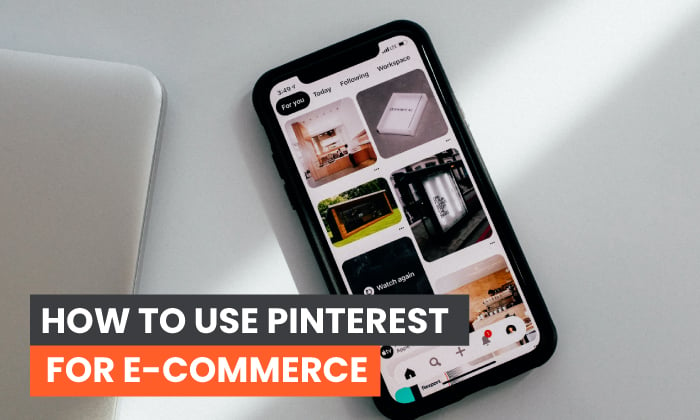
A lot of businesses still don’t take Pinterest seriously, which is a huge mistake.
Pinterest is now the third-largest social network in the United States. Data shows that Pinterest users spend 50% more than competitor sites, such as Instagram or Facebook (who hold the top spots in the US).
Not to mention, 90% or more of Pinterest buyers are brand-new to the merchant site, making their traffic very exciting.
Why use Pinterest for E-commerce?
With the rise of visual search, Pinterest is more critical for your business than ever before. According to Pinterest, their Lens feature can identify over 2.5 billion home and fashion objects (1.5 billion more than Google’s Lens).
Buyable pins helped transform the Pinterest e-commerce network into a high-quality sales funnel. Users can instantly buy products without having to trudge through the awareness, consideration, and purchase cycle.
You can also create links between product pages, websites, and social accounts while displaying your products to those who want to buy them.
That means your products are seen in more places, by more people.
More users, more sales, and more brand awareness.
What’s not to love?
What Types of Businesses Should Use Pinterest?
Almost every type of business can benefit from using Pinterest’s e-commerce platform. Whether you are selling furniture, food, or services, showcasing your products on Pinterest will build engagement.
Product-focused businesses can benefit from the instant success of Shopping Ads, Product Pins, and collections.
Service-oriented businesses can take advantage of Pinterest’s large following and diverse market to showcase their business.
Individual creatives also have a considerable advantage on Pinterest. DIY, crafting, fashion, and cooking are all hot topics on this popular site.
Although B2C businesses have a clear advantage on Pinterest, B2B companies can also see a considerable benefit if their target audience overlaps with Pinterest’s users.
What Types of Consumers Use Pinterest?
Pinterest has over 320 million monthly users. Though their users are mainly in the US, their global reach is continually growing.
Seventy-one percent of global Pinterest users are female. Pinterest calls their American female users “The Deciders” as they are responsible for 80% of household buying, and they control more than 50% of the wealth in the USA.
According to Pinterest, The Deciders control most food, drink, style, and beauty purchases in America. That means that their pins, boards, and suggestions carry real weight in the way households spend money.
Men are still using the platform as well. New data shows that more than 50% of new signups are men.
The majority of Pinterest users fall between the ages of 30 and 39. That demographic is followed closely by the 18-29 age group, making up 34% of Pinterest’s users.
One-third of American Pinterest users say they use the platform to follow brands. That means they are ready and willing to accept your messaging.
How to Setup for Pinterest E-commerce Sales
First, set up a business account. You can do this by converting a personal account or by creating a brand new business page. The business option gives you more analytics.
Having a well-branded, clear, and cohesive presence is the first thing to look out for when creating your Pinterest e-commerce page.
Fonts, logos, and consistent use of hashtags give your page a cohesive feel. People want brands they can rely on and trust. Keeping your social platforms professional and connected is an easy way to build brand integrity with your audience.
When you start posting, make sure you’re working with high-quality images, pinning like crazy, and keeping your product lists consistent and updated.
Quality counts here: eye-catching images, unique calls-to-action, and creative content will help attract and keep followers.
Use text overlays to increase mobile legibility and talk about special brand features like sales, discounts, blog posts, or brand updates — just like this example from Martha Stewart Living.
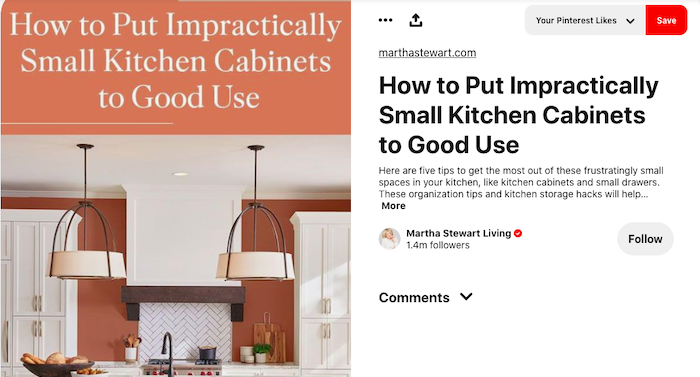
Along with your high-quality photography, branded posts, and wow-worthy products, there is one more thing to remember when posting: SEO.
Their search feature means that consumers will use keywords to find products, which means you’ll want to show up in that search.
Make sure to use keywords in your pin titles and descriptions to increase the reach of your content.
Hashtags are another great way to insert relevant keywords to your posts. Adding one or two to your main title will help your products show up more often.
If you need help researching keywords, UberSuggest is free and offers a range of services from keyword suggestions to search traffic data.
Remember, driving sales is about more than just having a good product. Consumers want brands they can trust to lead them through the buying process.
The better your content, the better your sales.
How to Sell Products on Pinterest
Now that you’ve got your branded page setup, it’s time to start selling.
You’ll need to link and verify your website to set up Pinterest e-commerce products. Make sure to choose the site you make sales from, as you can only verify one website with a Pinterest business account.
If you want to use a data source, you can create catalogs that will upload your entire product library to Pinterest all at once. Not all brands will have the right data sets to use this feature.
If that option doesn’t work for your e-commerce store, rich pins also pull metadata directly from your website and into Pinterest. You will have to upload each Pin individually, but they allow your audience to see product descriptions and prices directly on Pinterest.
With rich pins, mobile app users can search in a “shop” view, click on pins they like, and then simply click a blue shop button that directs them to a product page and checkout.
Here are examples of the shop view and a rich pin with a buy button on the app:
You can also use Promoted Pins to increase your reach and following.
Promoted pins are Pinterest’s version of paid ads. You can pay to have your pins pushed to the top of your user’s feed, helping more people see your content.
Promoted product pins are a great way to direct traffic to your website and emphasize your selling features.
As with most social media paid ads, you can choose specific campaign goals, target demographics, and boost engagement options that will dictate your promotion’s cost, frequency, and duration.
Promoted pins look the same as regular pins, but they will say “Promoted” at the bottom. You can see an example of that with this El Jimador ad in the center below.
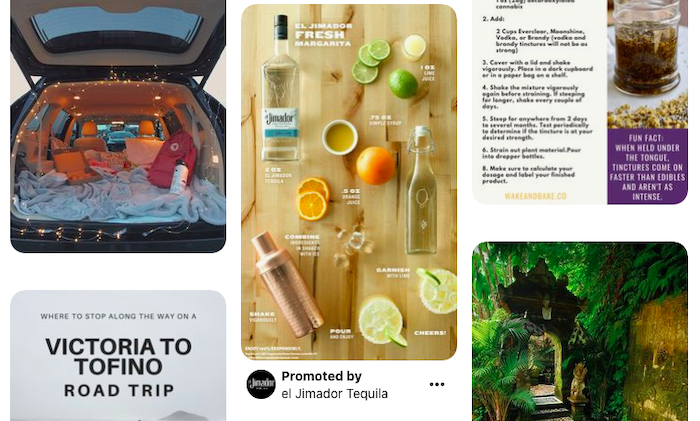
You can also use Shop the Look Pins, which allow you to link several products in a single pin. These pins are great for fashion looks, home decor items, and DIY projects!
Products have a small white dot, indicating that users can click and shop that piece. Here’s an example from ShopStyle:
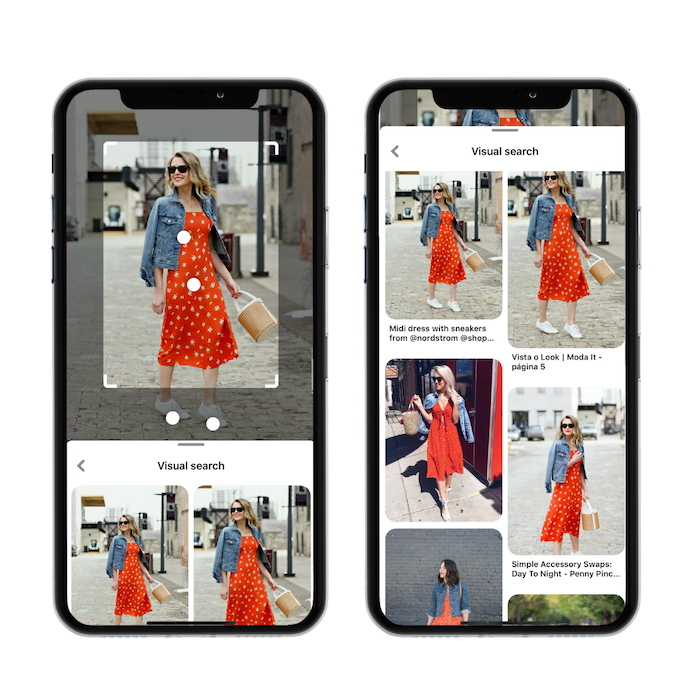
Pinterest will let you manually set up Shop The Look Pins once a product is uploaded. You can check out this guide for more info.
Looking for a walkthrough to set up your Pinterest e-commerce ads? Read An Incredible Guide to Generating Sales Using Pinterest Ads, or check out the video below!
How to Drive Sales with Pinterest E-commerce
If you want your Pinterest page to convert, you’ve got to gain a following. How can you make your page stand out from the crowd?
There are a few things you can do to make waves in the world of Pinterest e-commerce.
First, make sure to design your pins with shareability in mind. Infographics, relatable quotes, and DIY projects make for great Pinterest content.
Text overlays can be an effective way to lead your audience into your post. Try using an interesting quote to encourage clicks and interactions.
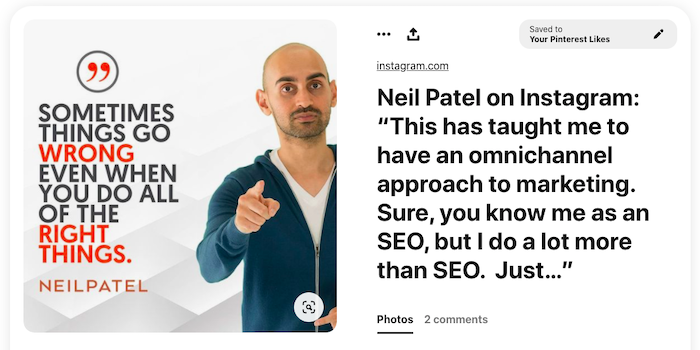
The top-five most popular Pinterest categories are:
- Travel
- Health & Wellness
- DIY
- Women’s style
- Beauty
Likewise, keeping trends, holidays, and news in mind will also help you stay in users’ minds.
Is Christmas coming up? Showcase your brand’s most popular family gifts. Is summer on its way? Time to break out the punch bowls and fun summer drink recipes!
Video pins are often in Pinterest’s top results, so intersperse your content with videos and animated graphics.
Using video pins also allows you to showcase your products in real-time, as consumers would use them. That can go a long way in converting your audience.
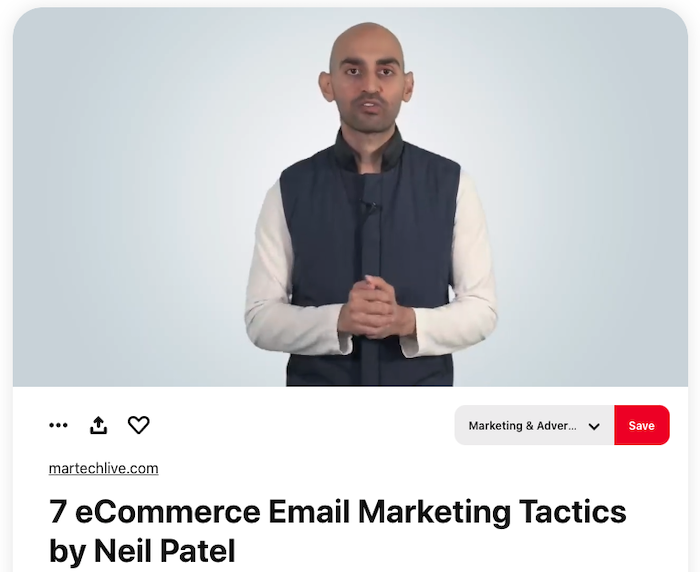
Next, it’s essential to create a sense of community around your brand.
All across the internet, people are looking to connect.
It isn’t enough to have the best product. You have to have the best community.
Brands that engage with their communities, and receive engagement back, have a better chance of growing and selling through online retailers.
Tactics like posting UGC (user-generated content), using influencer marketing techniques, and creating group boards, will help grow your community and bring more engagement to your brand.
Additionally, staying on top of your analytics will help you track your user data so that you can better understand your audience’s interests, wants, and needs.
Pinterest Analytics lets you see which pins drive the most clicks, what kind of audience you are attracting, and which categories bring in sales.
You’ve heard it before–don’t ever sleep on your analytics.
Conclusion
Pinterest e-commerce features were created with brand success in mind, so if you haven’t jumped on board yet, now is the time.
With quick-funnel options, reactive buying promises, and plenty of ways to increase engagement and awareness, Pinterest e-commerce is the place to be.
Here’s your challenge: create an in-depth Pinterest strategy, set up your business account, link your products, and start selling.
What can you test to increase your sales on Pinterest?
This marketing news is not the copyright of Scott.Services – please click here to see the original source of this article. Author: Neil Patel
For more SEO, PPC, internet marketing news please check out https://news.scott.services
Why not check out our SEO, PPC marketing services at https://www.scott.services
We’re also on:
https://www.facebook.com/scottdotservices/
https://twitter.com/scottdsmith
https://plus.google.com/112865305341039147737
The post How to Use Pinterest for E-commerce appeared first on Scott.Services Online Marketing News.
source https://news.scott.services/how-to-use-pinterest-for-e-commerce/
No comments:
Post a Comment